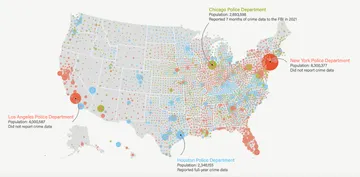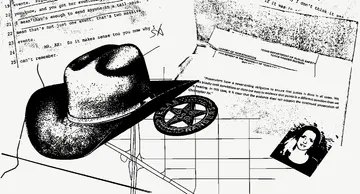This is The Marshall Project - Jackson’s newsletter, a monthly digest of criminal justice news from around Mississippi gathered by our staff of local journalists. Want this delivered to your inbox? Subscribe to future newsletters.
Welcome to our Judicial Election edition. This November election is not just about Mississippi’s presidential and congressional races. Two contested seats on the state Supreme Court are up for election, plus a seat on the Court of Appeals, and there’s a special election for the Hinds County Court. While the presidential race makes headlines every day (or minute, it seems), the Mississippi Supreme Court makes decisions that can affect how you live in the state. We’ll also explain the complex law surrounding the right to vote for the incarcerated and people with felony convictions. Many can still vote!
Meet the people running to be judges in Mississippi
Judges are elected officials who have great power over the lives of Mississippi residents. They make decisions about the law, your civil rights and even who lives or dies. Last month, the state Supreme Court denied the appeal of Willie Jerome Manning, who has been on death row since 1994. The court later granted his defense team until the end of October to convince the court to hear his case again, the Northeast Mississippi Daily Journal reported.
Despite the immense power they hold, many people don’t even know who local and state judges are or what they stand for.
The Marshall Project - Jackson and Mississippi Today published a comprehensive guide to the candidates in the contested Nov. 5 judicial elections for the state’s Supreme Court and Court of Appeals, and a special election to Hinds County Court. We answered your questions about the judicial candidates so you can be a better-informed voter.
In this guide, you can find profiles of the candidates, the work they’ve done and who is funding their campaigns. To download a printable PDF version of the guide, click here. If you’d like to hear from most of the candidates in their own words, read their responses to our questionnaire here.
Have you registered to vote on Nov. 5? The last day to register is Monday, Oct. 7. Need to know if you’re registered? Click here to check your status. For more information on how to register, click here.
Mississippi ban keeps thousands from the polls
John Cook moved back to Mississippi in 2022 after more than 15 years away. Though he voted legally in Georgia, a 40-year-old conviction bars Cook from casting a ballot in his home state. Mississippi is one of only 11 states that ban at least some people with felony convictions from voting for life, according to The Sentencing Project.
“It’s a life sentence,” Cook said. “I’m being deprived even though I’ve served my time.”
A reform effort died in the Mississippi Legislature earlier this year and a federal appeals court left the law in place this summer. That means Cook is among more than 55,000 people in the state who won’t be able to cast a ballot in this year’s presidential election, court records show.
Critics deem Mississippi’s law especially confusing. The state imposes a lifetime voting ban on people convicted of a range of violent and nonviolent crimes, but allows people convicted of many other crimes to retain their voting rights, even while still in prison.
The law is rooted in Mississippi’s racist 1890 state constitution, which was intended to block Black voters from the ballot. In recent years, several lawsuits have asked federal courts to toss out Mississippi’s law, but no court has done so. Cook said people who have turned their lives around continue to pay the price.
“You can’t just use something from 1890,” Cook said, “to tell me here in 2024 that I’m still a bad man.”
‘Your Right to Vote’ forum
The right to vote is a fundamental part of our democracy, but it has been kept away from tens of thousands of residents because of the state’s disenfranchisement laws. Why is it important to vote? How do we ensure that everyone who is able to vote takes advantage of their rights, including people who are incarcerated?
These were the questions discussed at the “Your Right to Vote” live forum, which was held at the Two Mississippi Museums Sept. 26. The event was hosted by The Marshall Project - Jackson and co-sponsored by the Alluvial Collective and the Alpha Epsilon Lambda chapter of Alpha Phi Alpha Fraternity.
Speakers included Waikinya Clanton of the Southern Poverty Law Center, Chauncey Spears of the Alluvial Collective, Brooke Floyd of the People’s Advocacy Institute and Mississippi state Rep. Timaka James-Jones.
Attendees viewed the latest episode from The Marshall Project’s video series, Inside Story, which showed one woman’s journey as she tried to restore her voting rights after serving a felony conviction sentence. In Mississippi, at least 55,000 residents over the past 30 years have been stripped of their right to vote after being convicted of a disenfranchising felony crime. Felony disenfranchisement is outlined in the state’s 1890 constitution and was originally created to stop Black people from voting. The law has since been updated and federal courts have ruled that there is no racist intent behind banning people for life from voting.
Also in the news
Mental health resources. A new 83-bed facility is slated to open early next year at the Mississippi State Hospital. This additional space should cut waiting times for people who face criminal charges but need mental health treatment, officials say. People in that situation have often had to sit in local jails waiting for the treatment they need. Mississippi Today
Reforming youth court. A commission led by a judge is urging reform of the state youth court system, with two options for overhauling the current system. A scaled-down reform effort died in the state Legislature earlier this year. Northeast Mississippi Daily Journal
Feds probe local law enforcement. A scathing Justice Department report has detailed alleged civil rights violations and excessive policing in the small town of Lexington. Mississippi Today That report comes as federal officials recently announced a new investigation into the Rankin County Sheriff’s Department following the “Goon Squad” brutality case. Mississippi Free Press
New appeals court judge. Gov. Tate Reeves has appointed northeast Mississippi District Attorney John Weddle to fill a judicial vacancy on the Mississippi Court of Appeals. The Associated Press The governor then selected attorney Jason Herring to replace Weddle as district attorney. Northeast Mississippi Daily Journal
Send us your story tips!
If you’ve experienced or witnessed something in the criminal justice system that you think we should look into further, contact us through this form or jackson@themarshallproject.org. All tips are confidential.

